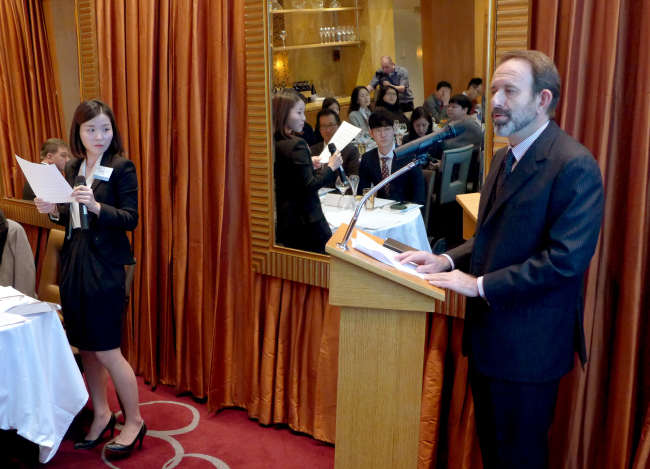Imagine a turquoise blue ocean that encircles a beach lined with centuries-old edifices, their facades glowing in sunlight and reddish rooftops sloped gently toward the sea.
Fancy a plate full of fresh seafood, olive oil, cheese, tomatoes, pizza and legumes, on a balcony overlooking the view.
Visualize artfully arranged amenities, museums and monuments that exude the depth of Italian culture condensed over centuries.
These are the experiences taken in by those traveling to southern Italy on a “Signa Maris” project ― a tourism system that integrates the nature, culture and gastronomy of the sea and land.
The Italian embassy, in collaboration with the Italian Chamber of Commerce in Korea, held a seminar Friday to promote the program.
 |
Italian Ambassador Marco della Seta (right) speaks to participants at a press conference organized to promote tourism in southern Italy last Friday. Joel Lee/The Korea Herald |
“The ‘Signa Maris’ project will introduce the lesser known parts of Italy ― Campania, Puglia, Calabria and Sicily ― which are indeed the most iconic areas associated with the Mediterranean,” Italian Ambassador Marco della Seta said.
“There, the pleasant and gentle Mediterranean weather is all-year-round, along beautiful coastlines and islands, offering delicate regional cuisine and excellent traditional crafts.”
Tourists can experience the rich art and traditions of Naples, Lecce and Palermo, as well as hike on the active volcanoes of Etna, Vesuvius and Stromboli, Seta highlighted. “Above all, you will discover the warmth of southern Italy and our people.”
The program aims to link 38 attractions in those four regions, most notably Capri Island, Naples, Salento, Sorrento, Amalfi Coast and Taormina, in an integrated marina system called “nautical tourism.” The program combines local gastronomies, cultural events and shopping on the backdrop of picture-perfect beaches, gulfs and inlets.
In recent years, access to Campania, Puglia, Calabria and Sicily has improved markedly, due to extensive modernization of infrastructure, such as high-speed trains, highways and international airports, the ambassador noted.
The project was devised and sponsored by the Italian Ministry of Cultural Heritage and Activities and Tourism, the European Union and the Italian President of the Council of Minister, among other agencies.
By Joel Lee (
joel@heraldcorp.com)








